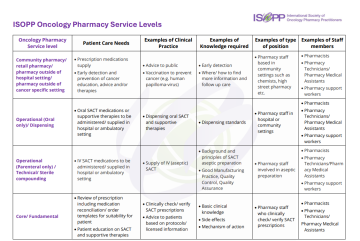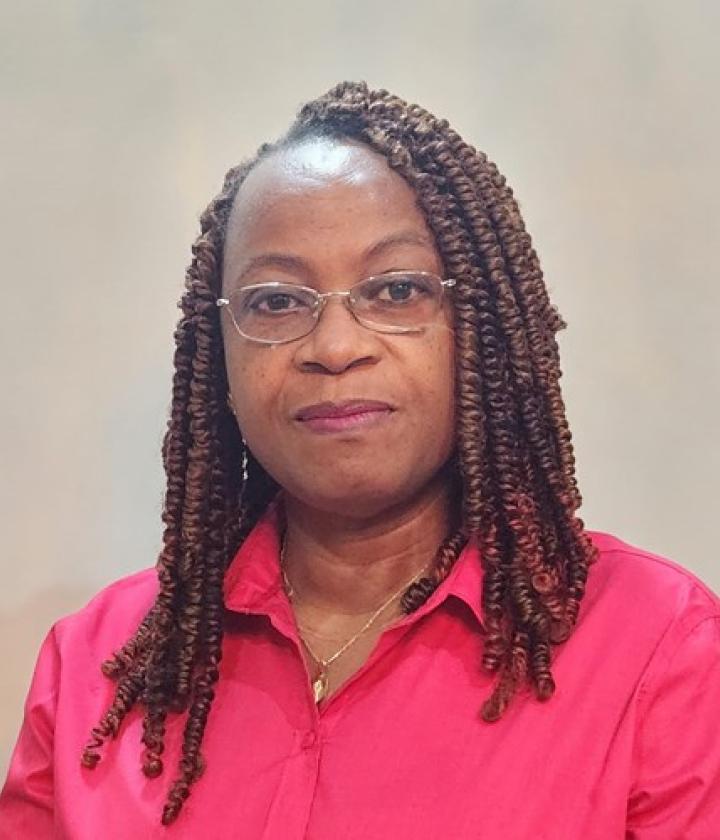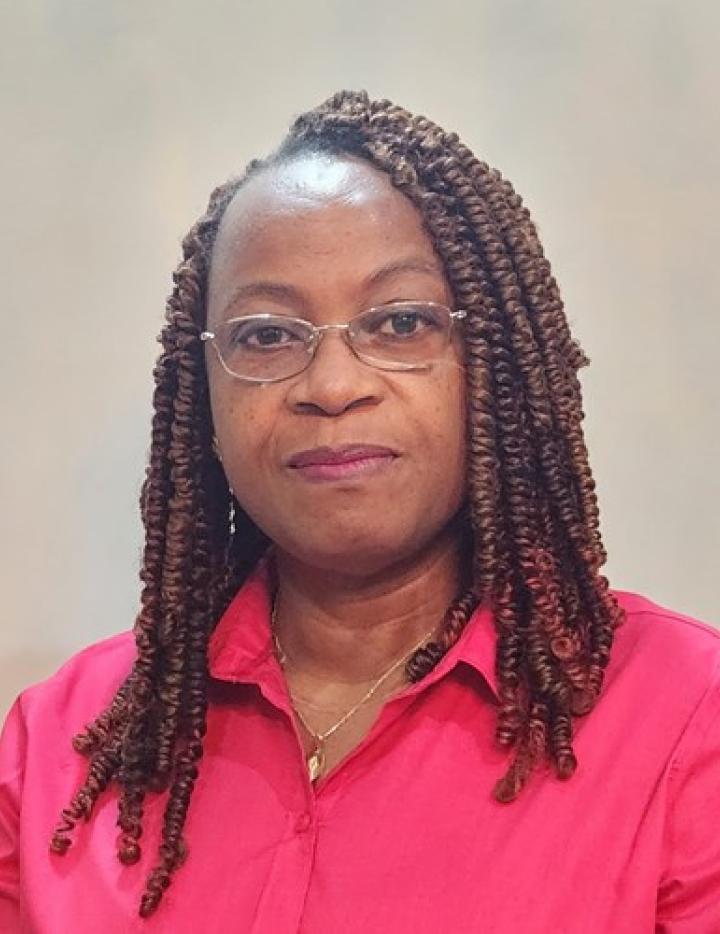ISOPP Oncology Pharmacy Service Levels
The ISOPP Oncology Pharmacy Service Levels will assist in advancing ISOPP's strategic objectives, particularly with respect to facilitating professional development and advocating for oncology pharmacy advancement, by connecting countries with mentoring opportunities, sharing of educational resources, and providing a benchmark and a description of possible oncology pharmacy services.

For the full tables please see link below.
ISOPP Standards of Practice
The ISOPP Standards of Practice can be used in conjunction with the ISOPP Oncology Pharmacy Service Levels to advance oncology pharmacy services in individual countries.
The ISOPP Standards of Practice provide evidence-based guidance on the safe handling and management of cytotoxic and other hazardous drugs in oncology pharmacy, and represent an international consensus on best practice.
Overview of the paper from an ISOPP member

Global oncology pharmacy service levels and knowledge requirements: A review by the International Society of Oncology Pharmacy Practitioners.
Introduction:
The International Society of Oncology Pharmacy Practitioners (ISOPP), representing over 3500 members in 110+ countries, aims to engage members, empower oncology pharmacists globally, support professional development, and advocate for the profession. Clinical Oncology pharmacy services vary globally due to differences in training, workforce, and access to patient records. While recognized as a specialty in many countries, oncology pharmacy covers more than patient care, include cancer prevention guidance, medication management, and systemic anticancer therapy (SACT). These services improve patient outcomes, reduce healthcare costs and burnout. However, there is limited global research on the full scope and knowledge requirements of these services—this study aims to address that gap using ISOPP’s service level framework.
Methods:
● Survey Design: A 57-question survey was created by subject matter experts, distributed from June to September 2024.
● Participants: 53 ISOPP global oncology pharmacy leaders from 45 countries; 35 countries responded.
● Data Collection: Included questions on protected titles, education access, oncology service levels offered, and knowledge requirements.
● Analysis: Responses were reviewed by two researchers, discrepancies were clarified by follow-up. Each country’s response was reviewed against the new ISOPP Oncology Pharmacy Service Levels created to confirm if the service level was offered.
Results:
Protected Titles:
● Pharmacist was a protected title, with minimum qualifications ranging from Bachelor of Pharmacy to Doctor of Pharmacy, in all 35 (100%) responding countries,
● Pharmacy Technician was a protected tittle, with the minimum qualifications ranging from completion of a four-year secondary school to Diploma, in 18 (51%) countries.
● Oncology Pharmacist was a protected title in 4 (11%) countries
Education and national organisations:
● 29 (83%) had postgraduate education access (Master’s or PhD).
● 14 (40%) had access to General Pharmacy Practice Residency (PGY1).
● 9 (26%) had access to Oncology Specialty Residency (PGY2)
● 9 (26%) had access to Fellowship (research).
● 14 (40%) had access to and used Board Certification (BCOP).
Service Level Provision:
● 40% of countries provided all seven ISOPP service levels.
● Countries with a lower Human Development Index (HDI) tend to offer fewer advanced or strategic oncology pharmacy services with some exceptions.
● With limited data analysis, the observed trend maybe reflecting stage of clinical pharmacy development, not necessarily the quality of cancer care levels,
Disparities by HDI:
● Countries with higher HDI more likely offered full service levels, while some lower HDI countries, offered comprehensive services, often with government support.
Discussion:
ISOPP Oncology Pharmacy Service Levels:
● The refinement and expansion oncology pharmacy service levels led to the establishment of ISOPP Oncology Pharmacy Service Levels, aiming to standardize definitions and terminology globally
● Helps countries self-assess and align their services with proposed levels.
● Helps countries benchmark services and advocate for expansion of services and model of care.
Variations Across Countries:
HDI Correlation - Countries with a lower (HDI) tend to offer fewer advanced or strategic oncology pharmacy services, while some high-HDI countries (e.g., Iceland, Malta) lack advanced services, possibly due to smaller populations or different healthcare priorities. Conversely, low-HDI countries (e.g., Nigeria, Kenya, Pakistan, Ghana) demonstrated comprehensive oncology pharmacy services, likely supported by strong governmental initiatives in cancer care. Community Pharmacy Gap - some countries did not offer community-level oncology pharmacy services, due to insufficient knowledge of oral anticancer therapy.
Need for Education and Certification:
● Emphasis on postgraduate education and structured certifications like BCOP.
● Suggestion to create an international oncology pharmacy certification, to standardize competencies globally.
Limitations:
● Survey was only in English, potentially excluding non-English speaking countries.
● Reliance on one respondent per country.
● Some gaps in respondents' knowledge about available education in their countries.
● Limited comparable studies available for reference.
Conclusion:
This inaugural global review of oncology pharmacy services across five continents led to the establishment of the ISOPP Oncology Pharmacy Service Levels. The findings aim to support ISOPP’s strategic goals. A re-evaluation in 4–5 years is recommended to measure progress and include more countries.
